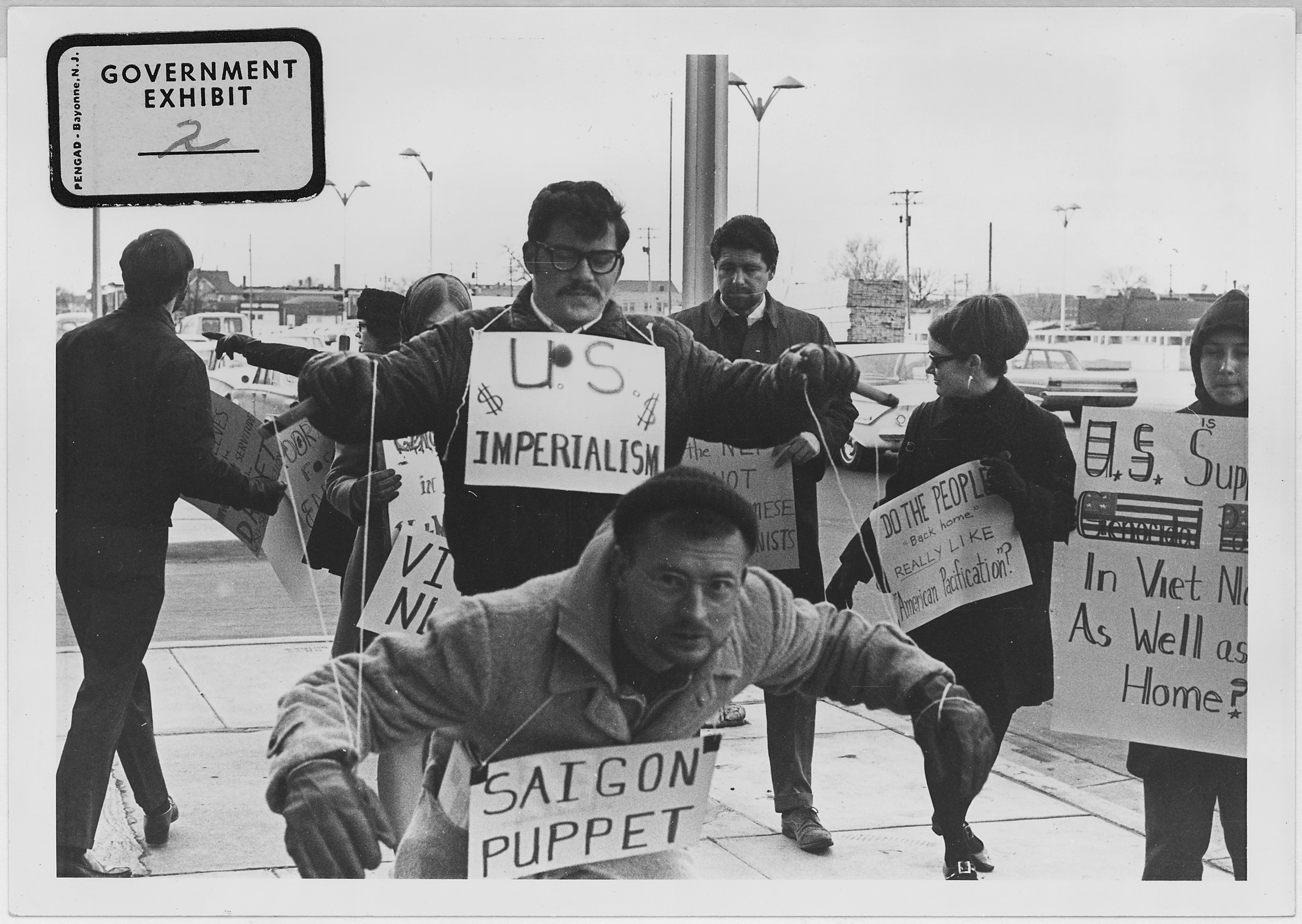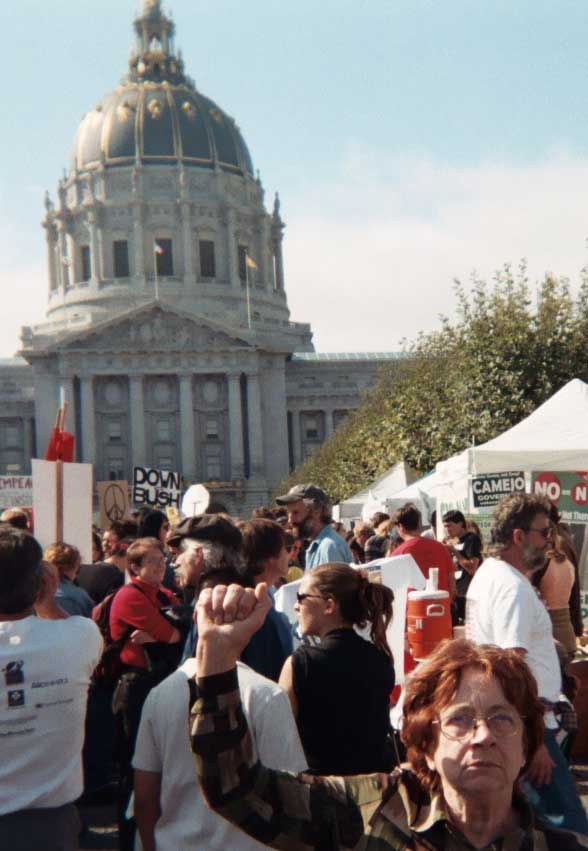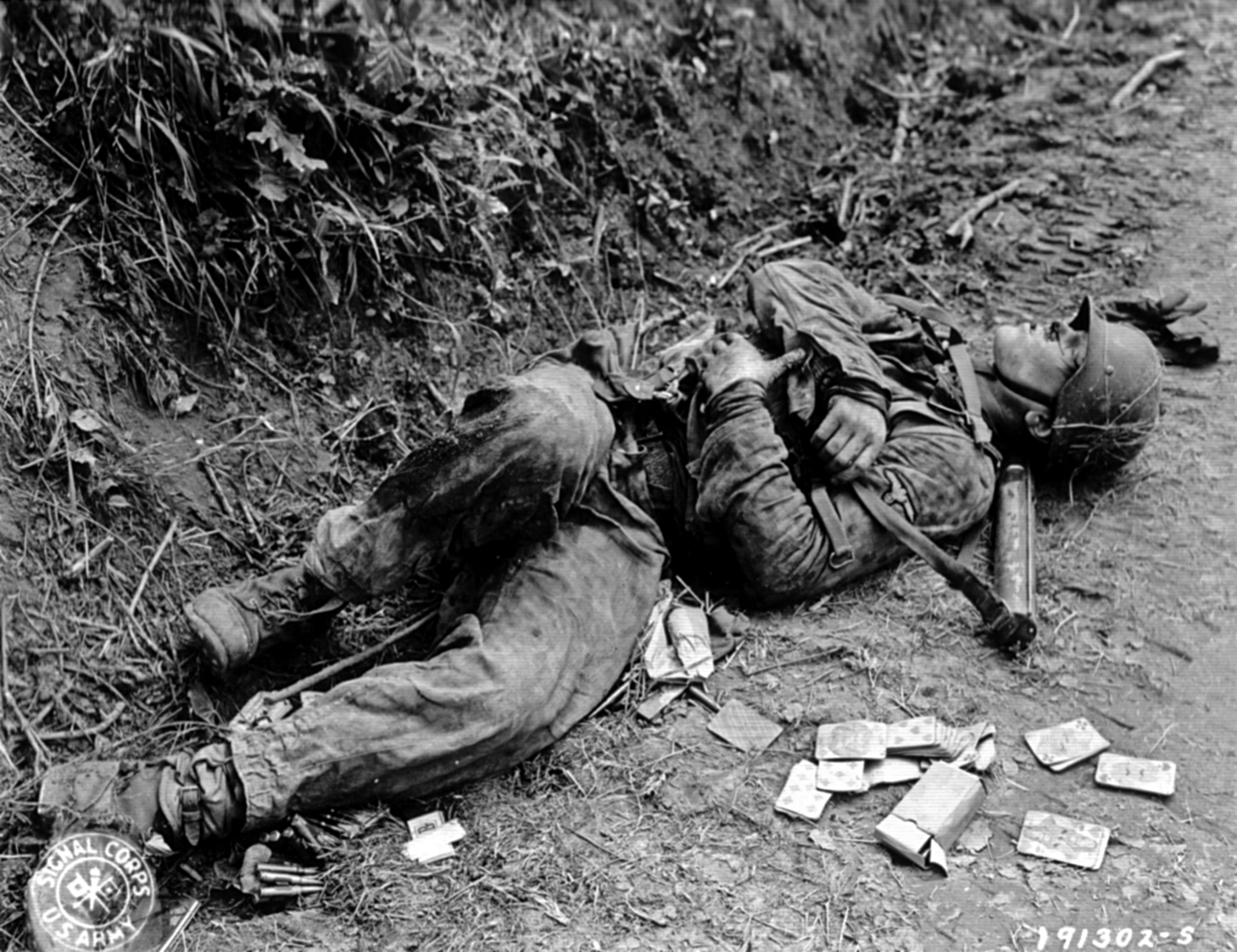|
War-weariness
War-weariness is the public or political disapproval for the continuation of a prolonged conflict or war. The causes normally involve the intensity of casualties—financial, civilian, and military. It also occurs when a belligerent has the ability to leave the conflict easily but continues to stay. War-weariness normally leads to a distrust in government or military leadership and can spark protest and anti-war movements. It can also be fueled when a belligerent is found guilty of war crimes, which can create domestic and international backlash. Rates of enlistment and the morale of the armed-forces are often affected by war-weariness. War-weariness is less likely to appear in military dictatorships, especially those with heavy propaganda and censorship. According to Immanuel Kant, democratic nations have a better chance of having unpopular news of the war reach the masses, which increases their chance and level of war-weariness. Historical examples * Cold War ** Anti-V ... [...More Info...] [...Related Items...] OR: [Wikipedia] [Google] [Baidu] |
Public
In public relations and communication science, publics are groups of individual people, and the public (a.k.a. the general public) is the totality of such groupings. This is a different concept to the sociological concept of the ''Öffentlichkeit'' or public sphere. The concept of a public has also been defined in political science, psychology, marketing, and advertising. In public relations and communication science, it is one of the more ambiguous concepts in the field. Although it has definitions in the theory of the field that have been formulated from the early 20th century onwards, and suffered more recent years from being blurred, as a result of conflation of the idea of a public with the notions of audience, market segment, community, constituency, and stakeholder. Etymology and definitions The name "public" originates with the Latin ''publicus'' (also '' poplicus''), from '' populus'', to the English word ' populace', and in general denotes some mass population ("t ... [...More Info...] [...Related Items...] OR: [Wikipedia] [Google] [Baidu] |
Anti-Vietnam War Movement
Opposition to United States involvement in the Vietnam War (before) or anti-Vietnam War movement (present) began with demonstrations in 1965 against the escalating role of the United States in the Vietnam War and grew into a broad social movement over the ensuing several years. This movement informed and helped shape the vigorous and polarizing debate, primarily in the United States, during the second half of the 1960s and early 1970s on how to end the war. Many in the peace movement within the United States were children, mothers, or anti-establishment youth. Opposition grew with participation by the African-American civil rights, second-wave feminist movements, Chicano Movements, and sectors of organized labor. Additional involvement came from many other groups, including educators, clergy, academics, journalists, lawyers, physicians such as Benjamin Spock, and military veterans. Their actions consisted mainly of peaceful, nonviolent events; few events were deliberately pr ... [...More Info...] [...Related Items...] OR: [Wikipedia] [Google] [Baidu] |
Psychological Warfare
Psychological warfare (PSYWAR), or the basic aspects of modern psychological operations (PsyOp), have been known by many other names or terms, including Military Information Support Operations ( MISO), Psy Ops, political warfare, "Hearts and Minds", and propaganda. The term is used "to denote any action which is practiced mainly by psychological methods with the aim of evoking a planned psychological reaction in other people". Various techniques are used, and are aimed at influencing a target audience's value system, belief system, emotions, motives, reasoning, or behavior. It is used to induce confessions or reinforce attitudes and behaviors favorable to the originator's objectives, and are sometimes combined with black operations or false flag tactics. It is also used to destroy the morale of enemies through tactics that aim to depress troops' psychological states. Target audiences can be governments, organizations, groups, and individuals, and is not just limited ... [...More Info...] [...Related Items...] OR: [Wikipedia] [Google] [Baidu] |
Peace
Peace is a concept of societal friendship and harmony in the absence of hostility and violence. In a social sense, peace is commonly used to mean a lack of conflict (such as war) and freedom from fear of violence between individuals or groups. Throughout history, leaders have used peacemaking and diplomacy to establish a type of behavioral restraint that has resulted in the establishment of regional peace or economic growth through various forms of agreements or peace treaties. Such behavioral restraint has often resulted in the reduced conflict, greater economic interactivity, and consequently substantial prosperity. "Psychological peace" (such as peaceful thinking and emotions) is perhaps less well defined, yet often a necessary precursor to establishing "behavioural peace." Peaceful behaviour sometimes results from a "peaceful inner disposition." Some have expressed the belief that peace can be initiated with a certain quality of inner tranquility that does not depend upo ... [...More Info...] [...Related Items...] OR: [Wikipedia] [Google] [Baidu] |
Non-interventionism
Non-interventionism or non-intervention is a political philosophy or national foreign policy doctrine that opposes interference in the domestic politics and affairs of other countries but, in contrast to isolationism, is not necessarily opposed to international commitments in general. A 1915 definition is that non-interventionism is a policy characterized by the absence of "interference by a state or states in the external affairs of another state without its consent, or in its internal affairs with or without its consent". This is based on the grounds that a state should not interfere in the internal politics of another state as well as the principles of state sovereignty and self-determination. A similar phrase is "strategic independence". History The norm of non-intervention has dominated the majority of international relations and can be seen to have been one of the principal motivations for the US's initial non-intervention into World Wars I and II, and the non-interve ... [...More Info...] [...Related Items...] OR: [Wikipedia] [Google] [Baidu] |
Crowd Psychology
Crowd psychology, also known as mob psychology, is a branch of social psychology. Social psychologists have developed several theories for explaining the ways in which the psychology of a crowd differs from and interacts with that of the individuals within it. Major theorists in crowd psychology include Gustave Le Bon, Gabriel Tarde and Sigmund Freud. This field relates to the behaviors and thought processes of both the individual crowd members and the crowd as an entity. Crowd behavior is heavily influenced by the loss of responsibility of the individual and the impression of universality of behavior, both of which increase with crowd size. Origins The first debate in crowd psychology began in Rome at the first International Congress of Criminal Anthropology on 16 November 1885. The meeting was dominated by Cesare Lombroso and his fellow Italians, who emphasized the biological determinates. : "Lombroso detailed before the first congress his theories of the physical anomalies ... [...More Info...] [...Related Items...] OR: [Wikipedia] [Google] [Baidu] |
Anti-war Movement
An anti-war movement (also ''antiwar'') is a social movement, usually in opposition to a particular nation's decision to start or carry on an armed conflict, unconditional of a maybe-existing just cause. The term anti-war can also refer to pacifism, which is the opposition to all use of military force during conflicts, or to anti-war books, paintings, and other works of art. Some activists distinguish between anti-war movements and peace movements. Anti-war activists work through protest and other grassroots means to attempt to pressure a government (or governments) to put an end to a particular war or conflict or to prevent it in advance. History American Revolutionary War Substantial opposition to British war intervention in America led the British House of Commons on 27 February 1783 to vote against further war in America, paving the way for the Second Rockingham ministry and the Peace of Paris. Antebellum United States Substantial antiwar sentiment developed in the ... [...More Info...] [...Related Items...] OR: [Wikipedia] [Google] [Baidu] |
Opposition To The Iraq War
Significant opposition to the Iraq War occurred worldwide, both before and during the initial 2003 invasion of Iraq by a United States-led coalition, and throughout the subsequent occupation. People and groups opposing the war include the governments of many nations which did not take part in the invasion, and significant sections of the populace in those that did. Rationales for opposition include the belief that the war is illegal according to the United Nations Charter, or would contribute to instability both within Iraq and the wider Middle East. Critics have also questioned the validity of the war's stated objectives, such as a supposed link between the country's Ba'athist government and the September 11 attacks on the United States, and its possession of weapons of mass destruction "certified" by the Niger uranium forgeries. The latter was claimed by the United States during the run-up to the war, but no such weapons have since been found. Within the United States, ... [...More Info...] [...Related Items...] OR: [Wikipedia] [Google] [Baidu] |
War On Terror
The war on terror, officially the Global War on Terrorism (GWOT), is an ongoing international counterterrorism military campaign initiated by the United States following the September 11 attacks. The main targets of the campaign are militant Islamist and Salafi-Jihadist armed organisations such as Al-Qaeda, the Islamic State and their international affiliates; which are waging military insurgencies to overthrow governments of various Muslim countries. The "war on terror" uses war as a metaphor to describe a variety of actions which fall outside the traditional definition of war taken to eliminate international terrorism. 43rd President of the United States George W. Bush first used the term "war on terrorism" on 16 September 2001, and then "war on terror" a few days later in a formal speech to Congress. Bush indicated the enemy of the war on terror as "a radical network of terrorists and every government that supports them." The initial conflict was aimed at al-Qaeda, ... [...More Info...] [...Related Items...] OR: [Wikipedia] [Google] [Baidu] |
Cold War
The Cold War is a term commonly used to refer to a period of Geopolitics, geopolitical tension between the United States and the Soviet Union and their respective allies, the Western Bloc and the Eastern Bloc. The term ''Cold war (term), cold war'' is used because there was no large-scale fighting directly between the two superpowers, but they each supported major regional conflicts known as proxy wars. The conflict was based around the ideological and geopolitical struggle for global influence by these two superpowers, following their temporary Allies of World War II, alliance and victory against Nazi Germany and Empire of Japan, Imperial Japan in 1945. Aside from the Nuclear arms race, nuclear arsenal development and conventional military deployment, the struggle for dominance was expressed via indirect means such as psychological warfare, propaganda campaigns, Cold War espionage, espionage, far-reaching Economic sanctions, embargoes, rivalry at sports events, and technolog ... [...More Info...] [...Related Items...] OR: [Wikipedia] [Google] [Baidu] |
Casualty (person)
A casualty, as a term in military usage, is a person in military service, combatant or non-combatant, who becomes unavailable for duty due to any of several circumstances, including death, injury, illness, capture or desertion. In civilian usage, a casualty is a person who is killed, wounded or incapacitated by some event; the term is usually used to describe multiple deaths and injuries due to violent incidents or disasters. It is sometimes misunderstood to mean "fatalities", but non-fatal injuries are also casualties. Military usage In military usage, a ' is a person in service killed in action, killed by disease, diseased, disabled by injuries, disabled by psychological trauma, captured, deserted, or missing, but not someone who sustains injuries which do not prevent them from fighting. Any casualty is no longer available for the immediate battle or campaign, the major consideration in combat; the number of casualties is simply the number of members of a unit who are not ... [...More Info...] [...Related Items...] OR: [Wikipedia] [Google] [Baidu] |
Immanuel Kant
Immanuel Kant (, , ; 22 April 1724 – 12 February 1804) was a German philosopher and one of the central Enlightenment thinkers. Born in Königsberg, Kant's comprehensive and systematic works in epistemology, metaphysics, ethics, and aesthetics have made him one of the most influential figures in modern Western philosophy. In his doctrine of transcendental idealism, Kant argued that space and time are mere "forms of intuition" which structure all experience, and therefore that, while " things-in-themselves" exist and contribute to experience, they are nonetheless distinct from the objects of experience. From this it follows that the objects of experience are mere "appearances", and that the nature of things as they are in themselves is unknowable to us. In an attempt to counter the skepticism he found in the writings of philosopher David Hume, he wrote the '' Critique of Pure Reason'' (1781/1787), one of his most well-known works. In it, he developed his theory of expe ... [...More Info...] [...Related Items...] OR: [Wikipedia] [Google] [Baidu] |



.jpg)




.png)

